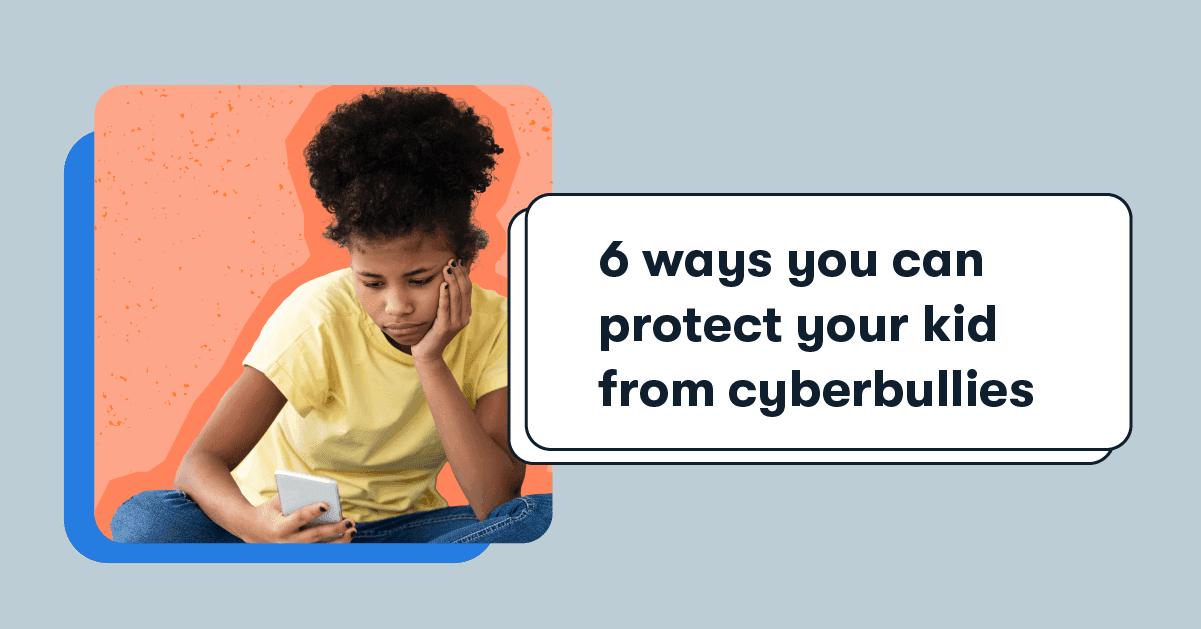6 ways you can protect your kid from cyberbullies

By Alexandra Boeving Allen, PhD, Jun 21, 2023
Cyberbullying doesn’t leave bruises or scars, but that doesn’t mean it’s harmless — and it can be harder for parents to spot. According to a 2018 Pew research poll, 59% of kids between the ages of 13 and 17 have experienced cyberbullying. Younger kids aren’t immune either. A 2019 survey of 1,000 parents found that kids as young as six had been targeted by bullies on social media sites or apps.
This may feel scary, but there are steps you can take to keep your kid safe. (And surprisingly, none of them include confiscating their phone.)
Here’s what every parent needs to know about cyberbullying.
What is cyberbullying?
It’s important to realize that most cyberbullying isn’t as extreme as you see in the news. Not all online conflicts are cyberbullying, either. Sometimes kids disagree with each other, or have inside jokes that don’t make sense to an outside party — like, uh, a well-meaning parent.
Cyberbullying can also happen by mistake. We’ve all said things by email or text only to realize they came across as hurtful in a way we didn’t intend.
That said, here’s what cyberbullying can look like:
Sending mean emails, texts, or online chats/private messages
Spamming (harassing someone with constant messages)
Posting mean comments on social media
Spreading gossip or rumors online
Repeatedly attacking or killing someone’s avatar in an online game
Pretending to be someone else by creating a fake online profile
Threatening someone online
Sharing photos or videos without consent
Signs to look out for
If your kid is being cyberbullied, they might not want to tell you — even if you’re super-close. It’s common for kids to feel shame and embarrassment about being bullied. They could also worry that you’ll take their technology away, or that telling you could make things worse.
If your kid is being cyberbullied, you could notice:
They get upset or angry when they’re online
They don’t want you to see their phone or computer
They no longer want to hang out or talk with friends
They’re not “themselves” — their behavior has shifted in a noticeable way
Their grades have dropped
They have trouble focusing
They suddenly delete their online accounts
How to prevent cyberbullying
There is a lot you can do to reduce the chances that your kid ever has to deal with a cyberbully. Here are a few options:
Talk about it. Even before your kid gets a phone or social media accounts, discuss what cyberbullying can look like, and how if it does happen to them, it’s not their fault. Let them know that you want them to share those experiences with you, and you won’t be mad at them (or take away their phone) if they do. If your kid’s already online and this convo hasn’t happened yet, no sweat! It’s never too late to talk about it.
Know what younger kids are up to online. A condition of their online accounts can be that you’ll keep tabs on them. Make note of their screen names and passwords. Monitor what’s posted, even if you don’t post yourself.
Ask if you can follow your teen online. Secretly monitoring their social media accounts sends the message that you don’t trust your teen. Instead, ask permission to follow them. Setting up ground rules about when/what you’ll post may help them agree, but if they say no, respect their decision.
Set limits. Establish family rules about screen time. For instance, younger kids are better off using their devices in common areas and not taking them to bed at night. Shutting off wifi at certain times can help enforce screen limits on older kids.
Go over internet safety. Talk to your kid about why their accounts should be private. Let them know not to give out personal info, post things that they don’t want widely circulated, or accept invites from people they don’t know or trust.
Help them be an ally. Talk through what your kid can do if they see someone else being cyberbullied. Make sure they know not to share content or respond when they’re angry. Instead, they can come to you or another adult and explain what’s going on.
What to do if your kid is experiencing cyberbullying
No parent likes to think about their kid being bullied online (or anywhere!), but if it happens, here are some things you can do to help:
Try to stay calm. Reassure your kid that you’re there to support them, and you’re glad they came to you.
Decide (together) what to do next. Before you step in, your kid may want to try to handle the situation on their own. If so, let them know you’ll still monitor the situation closely to make sure it doesn’t escalate and be there to help them through it.
Contact your kid’s school. If your child is being bullied by a classmate, it may be appropriate to notify the school. Take a screenshot to document what happened. Then, reach out to your kid’s guidance counselor or principal and ask what actions they plan to take.
Know when to escalate. Despite what you see in the news, it’s rare for cyberbullying to be so intense that police need to get involved. But if the incident with your kid includes physical threats, hate crimes, stalking, or sexually explicit messages, photos, or videos, it’s time to contact law enforcement.
When you need more support
A Brightline therapist can help your kid or you deal with cyberbullying — we’re here to support you at any time.
There are also plenty of safe resources your kid can directly reach out to, like the Crisis Text Line and Stop It Now, which provide crisis hotlines especially for kids and teens. The Trevor Project is another great resource, especially for LGBTQ+ kids.